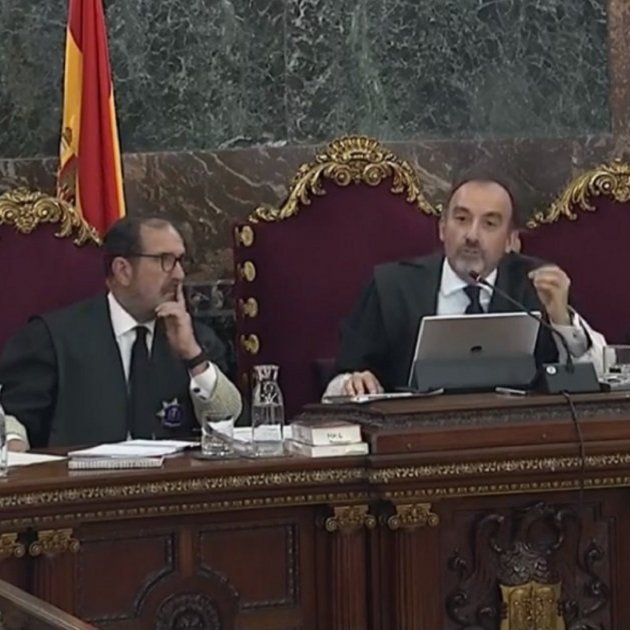When 150 Spanish police officers have to appear as witnesses so that all of them can tell the same story, and the tale of violence that each of them has to recount is about receiving a kick, or being spat on, getting a few scratches, something about a baby stroller and very little else, the feeling of wasting time is constant. That is a sensation which is felt by the judges too, exhausted from the marathon of police testimonies that have been the stodgy fare of the Catalan independence trial for the last two weeks.
Presiding judge Manuel Marchena listens carefully and cuts offs defence lawyers if he feels they've crossed the line. He continues to enforce his ban on confronting the witnesses with video evidence that contradicts their words. The videos will be examined subsequently by the court, he says. Some of the police officers seem to demonstrate a prodigious memory which suddenly fails when they have to respond to defence questioning. The rank-and-file police versions of events show another 1st October entirely, one which the lawyers are anxious to extract details of, in order to later show how the images tell a different story, to force the witnesses into contradictions which discredit the violence, the tumult and, in turn, the rebellion - key concepts in proving the charges for which the defendants face sentences of up to 25 years of prison.
But what happens is that Marchena comes down like a ton of bricks on the lawyers. He blocks their lines of questioning, excessively at times. And today, in an attempt to avoid lawyer Benet Salellas, of Jordi Cuixart's defence team, from putting a riot squad member on the ropes for his testimony about what went on at Cappont in Lleida province, he put his foot down, one more time. But this time, his explanation as to why Salellas had to withdraw the question fell short. "Ask questions that are of interest to the court", was all he came up with, and was not amused by the lawyer's argument that the line of questioning was part of his client's defence.
A stuck record
The police accounts are repeated over and over again. This is the version of events that the prosecution wants to sell, but for the moment it is not proving anything. The defence lawyers can't show the contrary without being able to show the videos. In this regard, the trial is in a cul-de-sac until the expert witness phase, but before that the police testimonies will still have to be compared with those of the protesters, who will begin appearing during May.
In the meantime, riot squad members continue to assert that they didn't see police beating members of the public. Today one police officer went as far as to say that a woman hurt herself by simply banging into a wall. "The police actions were exemplary: there was no 'massacre' as they say in some places," said one of the witnesses.
And the issue of children came up again. In recent days, the court has heard that Catalans at the voting centres brought their kids with them as "human shields". Today, the last day of hearings in the Supreme Court before the Easter break, the subject returned: "I saw a man with a small child. Bringing kids to a place where they could be injured... it doesn't seem logical."
Some of the Spanish police officers talk of a "violent mob," but when asked to go into detail, the horror of that description tends to evaporate. Yes, someone gave a "kick", there were people who "spat", and yes, in one case, some were "throwing stones" - although the officer that made that claim then clarified, under defence questioning, that no, he didn't actually see any stone in the air. No.
